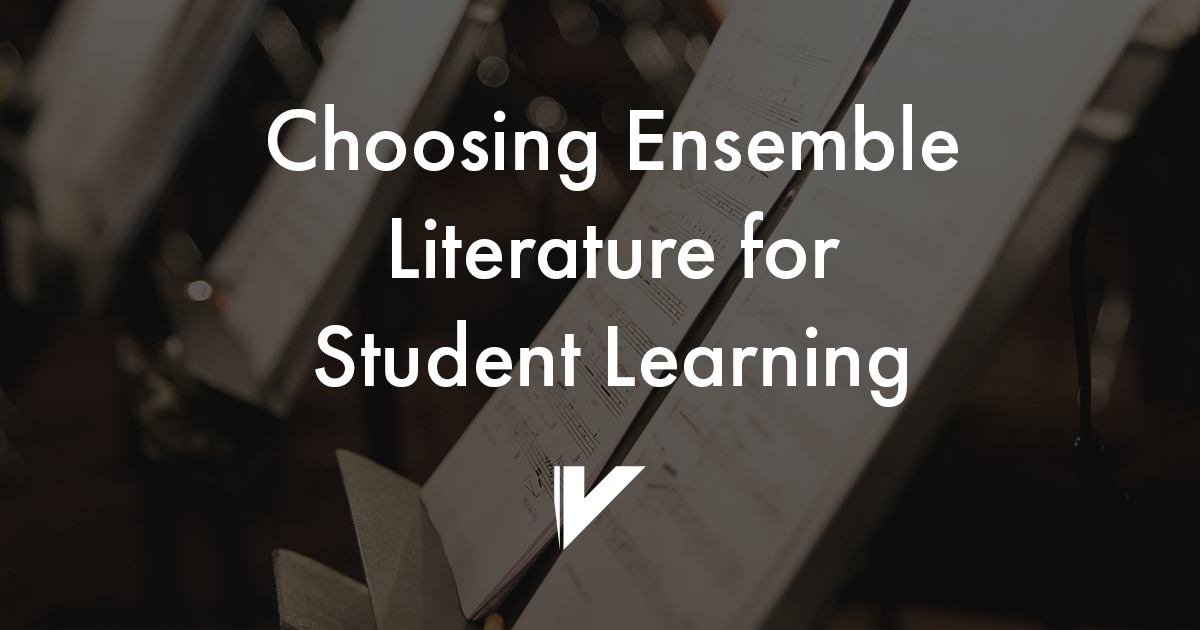Choosing Ensemble Literature for Student Learning
by Anthony Dahl
Date Posted: August 01, 2019

As music educators teaching ensemble classes, choosing literature for our ensembles is one of the most important aspects of our jobs. The music we choose dictates which concepts our students will learn in our class.
Often, choosing something that will “sound nice” by concert time becomes the primary objective. While it is important to practice and perform literature that will allow for student success, having a “nice” concert cannot be the sole end goal for music education. This is no better than having a high test score being the sole end goal of a math class!
Instead, we need to understand that our music is our curriculum; what we choose to teach has a direct impact on what our students can learn. With this in mind, we must choose literature with the end goal of teaching the concepts that will allow our students to develop into well-rounded musicians.
"...every stop within the ensemble rehearsal becomes an opportunity for the teacher to transmit information to help students gain new understanding." - Anthony Dahl
Beginning Stages
When thinking about concepts for student learning, I find it useful to break learning down into six subsets: Technique (how to physically play the instrument), Literacy (rhythms and terminology), Elements of Music, Style, Historical and Sociological, and Emotion and Meaning.
As I begin to search for literature, my first step is to determine what concepts in each area my students have room for growth in, and then search for music which contains opportunities for my students to practice those areas.
By choosing literature with these learning opportunities “baked in” every stop within the ensemble rehearsal becomes an opportunity for the teacher to transmit information to help students gain new understanding, rather than just taking another rep to get the right buttons pushed at the right time.
Example Applied
For example, in my high school ensemble last year, one of the areas I wanted to focus on in Technique was tuning. I wanted students to explore how their personal posture, embouchure, and pitch tendencies effected the music. I also wanted to explore the concepts of balance and blend, as well as talk about just tuning within chords. Because I knew up front that I wanted my students to learn about all of these things, I chose to perform On a Hymnsong of Philip Bliss by David Holsinger and Paradise Awaiting by William Owens, both of which has ample opportunities to explore all of these concepts. I also knew I wanted to work on improvisation in the concert band setting, so I programmed Reflaxo e Danca by Lissa Flemming May. I also knew I wanted to focus on mixed meter, so I programmed Into the Joy of Spring by James Swearingen and To Create a Voice by Carol Brittin Chambers.
Questions to Ask
As I choose literature, I am thinking about my students in terms of each concept sub-set. As you begin to plan, you may want to ask yourself some of the following questions:
What individual and group techniques need reinforcement?
What rhythmic patterns do my students need work on?
What academic vocabulary needs development?
What styles or time periods do my students lack exposure to?
What emotional connections do I want to share with my students?
After answering these questions for your students, then the quest for literature to achieve this goal can begin. Searching out literature can seem daunting, so here are a few resources that I have used that can help narrow down your choices.
- American Band College Literature List - “The List” studied as part of the degree program at the American Band College.
- Facebook Band Directors Group Twice Taught List - A list of pieces taught multiple times, curated by real band teachers.
- Colourfull Music - Features complete programs of music written by women and composers of color for all grade levels
"It’s up to you to identify the concepts that your students need to learn..." - Anthony Dahl
As my mentor Dr. Eric Hammer used to say, “the main purpose of music instruction in ensemble classes is to provide the musical knowledge and understanding needed for a comprehensive music education.” It’s up to you to identify the concepts that your students need to learn and then to choose the best literature for your students to ensure that it happens!